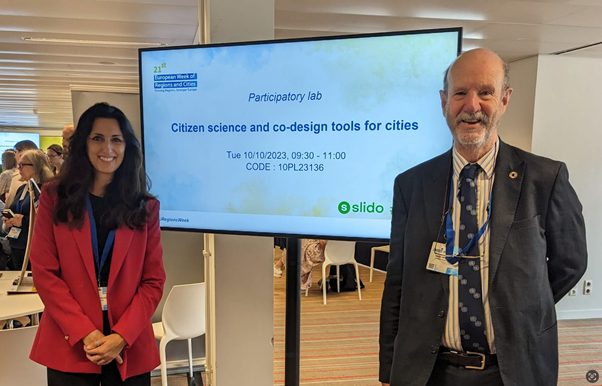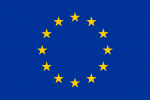Project AURORA was one of 9 citizen science projects presenting at the 21st EU Week of Regions and Cities. The session was titled: Citizen Science and Co-design Tools for Cities and was held on 10 October 2023. A summary of the programme for the event can be found here.

Citizens and economic stakeholders are the greatest assets when it comes to hitting Net Zero for carbon emissions, tackling city-wide air pollution, or building an effective biodiversity strategy. This event provided information on 9 cutting-edge citizen science and co-design tools that can encourage local communities to become active participants in creating more sustainable and liveable cities. The event included a keynote address from Thomas Osdoba Director of Net Zero Cities, and a panel discussion about the role of citizen science in supporting cities to tackle climate change, biodiversity loss, and pollution. Ana Belén Cristobal represented project AURORA on the panel and the event was moderated by Martin Brocklehurst from project AURORA.

The final part of the proceedings was an interactive session held in a café type format that allowed attendees to talk to the individual project leaders and learn more about the tools that are being developed. This face-to-face event was designed to encourage city and regional leaders to take up and apply these ideas. Over 140 people attended the event and the energy in the room during the café session gave some idea of the intensity of the discussions. Lars Lorenz presented the newly launched AURORA Energy App to considerable interest from attendees who expressed an interest in testing the App.

The European Week of Regions and Cities (#EURegionsWeek) is the biggest annual Brussels-based event dedicated to cohesion policy. It has grown to become a neutral platform to discuss common challenges for Europe’s regions and cities by bringing together a diverse community of speakers and participants. In 2022 the event reached a record number of almost 20,000 participants, 272 sessions and 528 partners and 2023 looks to continue that trend. New networks were established at the event that will support the plan to disseminate details about project AURORA to a European audience.
Following the event further discussions were held with:
- DG Environment and DG Clima policy leads within the European Commission;
- The European Universities Association who are proposing to set up a working group on citizen science;
- The Council of European Municipalities and Regions who expressed interest in working with the group of citizen science projects to share best practice across European municipalities; and
- The DG Environment Director for Green Diplomacy and Multilaterlism where discussions about how to influence Multilateral Agreements and UNEA 6 took place.

Project AURORA will follow up discussions with each of these organisations as we seek Ambassadors to promote our approach to reduce carbon emissions through citizen science, and to link that work with the development of energy communities within Universities and Municipalities across the EU.



